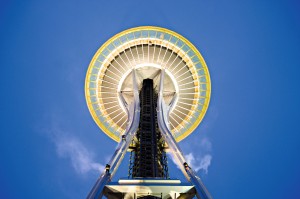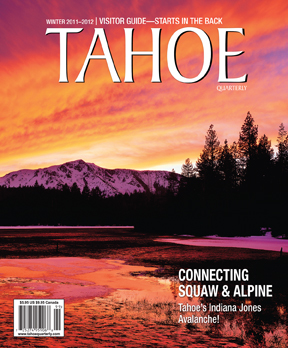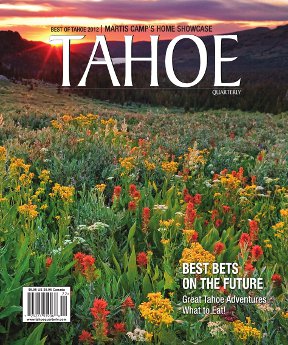Corporate Climbing
Reno company lands business by reaching for the sky.
Many a hardcore climber has had a youthful fling with the vertical, but eventually succumbed to the gravitational forces in work life. Jan Holan is one of the lucky ones—he discovered a way to parlay his yen for climbing into a new industry and a multi-million dollar business.
In 1994, Holan founded what is now Skala, Inc., an industry leader in the “work at height” industry—inspecting, cleaning and repairing large structures, using ropes to access otherwise inaccessible industrial sites.
Skala’s employees have dangled from the ramparts of the Brooklyn Bridge, the Hoover Dam and the Seattle Space Needle—and, increasingly, you’ll find them suspended from the nacelles of wind turbine towers.
“What we do is pretty off-the-wall,” says Holan. “The bottom line is that we essentially use modified mountaineering techniques to inspect and maintain inaccessible structures.”
Skala’s rope technicians use the same static kernmantle cords used by cavers, big wall climbers and special ops teams—which seems appropriate, given Skala’s predilection for attracting the kind of employees who, given their druthers, would be hanging from ropes, anyway. And if they’re not climbers, they’re white water boaters, backcountry skiers, trail runners: hardcore athletes who prefer their adventures served up raw.
Vertical integration
The company, now going on 16 years, is—excuse the pun—vertically integrated: In addition to its at-height services, it offers rope technician training (Cirque du Soleil, for example, hires Skala to train its riggers), and its own branded line of rope access equipment. Skala’s value proposition is straightforward: human-powered rope access is an elegantly simple, safe and economical solution (“Typically a quarter of the cost of a crane,” says Carolyn Casserly, Skala’s director of business development), without the attendant hassles of mechanized access.
The firm’s ascendancy has been dramatic: Current revenues are $3.5 million, a 600 percent revenue growth in the last five years, with a 40 percent revenue increase forecasted for 2011.
Holan, 39, didn’t strike out to build a business in heavy industry; he trained as a wildlife biologist at UC Davis. While in college, he launched a landscaping company to pay his tuition and, between studies, devoured the big walls of Yosemite Valley and the Sierra backcountry. He parlayed his climbing skills and organizational savvy into the directorship of UC Davis’s outdoor adventures program, and eventually founded the Bear Valley–based Mountain Adventure Seminars, one of California’s more successful mountaineering schools.
Just after the Northridge earthquake in 1994, Holan, still in school, was approached by the California Department of Transportation about instructing workers on using mountaineering rope techniques to inspect highway overpasses. Holan designed a training program and delivered the goods; for the next six years, despite his peripatetic lifestyle, organizations in need of rope instruction tracked him down and paid good money for training in industrial rope techniques. Work kept coming; before long, Holan decided to focus on the industrial rope access business rather than mountain climbing. In 2000, he relocated to Truckee (Reno-Tahoe International Airport figured prominently in his decision) and incorporated as Ropeworks (the company was renamed Skala in 2006). With rope technician training as his cash cow, Holan diversified into rope access services and equipment sales.
“The business was based out of my bedroom first, then expanded into the garage, extra bedroom, modified apartment suite and basically took over the entire house before I moved it into the 7,500 square foot training center in Reno,” he says.
Employees do what they love, love what they do
Meanwhile, Holan buffed out his staff by reaching into Tahoe’s talented pool of outdoor athletes (the well-known Tahoe City mountaineer Dave Nettle was an early partner), who were keen to marry vocation with avocation, and eager to master a discipline that smacked of adventure—the rope access industry has both rigorous national and international certifications not unlike those found in mountain guiding. Employees work outdoors, engage in creative problem-solving and, at the end of the day, impress both customers and competitors. Skala’s core clients include General Electric, HDR (an architectural and engineering firm) and the U.S. Department of the Interior.
Skala’s 35 employees, including its “non-traditional schedule,” or contingent employees, receive full benefits, including profit-sharing. Skala’s use of a contingent work force is not only savvy—job flexibility appeals to Millennials—but also supports the work-life balance Holan himself treasures. “I hate seeing people waste their lives away clock punching,” he says.
Ryan McAuliffe, 27, of Tahoe City, is paradigmatic of the Skala’s work-hard-play-hard crew. He recently completed a rigorous three-week project in southeast Alaska—21 inspections in 17 days—and upon his return to Tahoe, lit out for a two-week climbing road trip. McAuliffe believes he’s found an ideal gig, with the perfect company, in a booming industry. Working for Skala gives him the flexibility to do what he loves most.
“What can I say?” he says. “I like being able to ski on powder days.” Skala thrives on its “go for it” culture (“We’re all about ‘wahoo’ around here,” says Casserly) and the company’s success probably has as much to do with its emphasis on shared decision-making and participatory culture as its business model: Simply put, Holan gives liberal authority to the people whose hands are on the work. And the company has made a commitment to doing well by doing good with its focus on the “triple bottom line:” people and planet, in addition to profit.
Scoring an A as a B corp
In 2009, Skala became a B Corporation, one of a growing number of companies blessed by the B Lab, a Pennsylvania nonprofit dedicated to “creating a new sector of the economy which uses the power of business to solve social and environmental problems.” B Corps abide by B Lab’s stringent standards promoting transparency and accountability, and commit to wearing their financial, environmental and social scorecards on their sleeves. Skala, for example, practices open-book management, runs a paperless office and offers employees a share of the company’s increasing profits.
After 16 years in business, Holan understands the risks of growth—“losing touch with the culture that made it fun to work at Skala in the first place”—but his eventual aim is to transform the business into an incubator for personal development and leadership. Harking to his roots as a biologist, Holan grasps the interdependencies between environment and profits.
“I think of a business as an ecosystem,” says Holan. “Just like polluting one part of an ecosystem can have unintended consequences, one can’t treat anyone badly and expect to have a healthy environment to grow your business.”
As a freelance writer, TQ contributing editor Brad Rassler is also able to manage his work life and still make time to play in the outdoors.
Category: Winter 2010-2011







